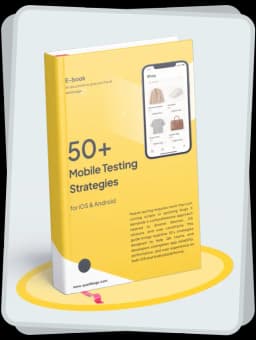Platform‑Specific Mobile QA
To ship once, that’s the dream—but on mobile, it only comes true when your QA strategy embraces the quirks of both major ecosystems. This post breaks down the hard‑won lessons, tactics, and tooling that keep top apps five‑star‑worthy across thousands of Android devices and the ever‑evolving Apple lineup.
Why Mobile Deserves Its Own QA Playbook
Mobile isn’t just “desktop with a smaller screen.” Phones and tablets come with:
Ultra‑diverse hardware – from $99 Androids to $1,500 iPhones.
Touch‑first UX – gestures, haptics, sensors, camera, biometrics.
Constrained resources – flaky networks, aggressive OS process killers, limited battery.
Gatekeeper stores – reviews, privacy mandates, notarization.
Neglect these factors and your polished web flow becomes a crash‑fest that tanks retention. Platform‑specific mobile app testing is how teams de‑risk releases before users rage‑tweet.

Get the Mobile Testing Playbook Used by 800+ QA Teams
Discover 50+ battle-tested strategies to catch critical bugs before production and ship 5-star apps faster.
iOS vs. Android at a Glance
| iOS | Android |
OS Landscape | Closed, yearly mega‑update; beta in June | Open; OEMs drip updates, 5+ versions in the wild |
Device Count | ≈ 30 active models | Thousands—chipsets, displays, sensors vary |
Store Rules | Apple HIG, ATT, notarization | Play Store self‑serve; OEM skins change UX |
Fragmentation Pain | Beta APIs break quickly; notch issues | Older OS + low-end hardware expose perf bugs |
QA Focus | Future-proofing, pixel-perfect polish | Device-lab breadth, tuning, OEM quirk hunts |
Performance Hotspots | Startup time, 120 Hz smoothness | Jank on low-end GPUs, background limits |
Takeaway: Same feature ≠ same risk. Tailor your mobile QA strategy accordingly.
Core Challenges (and How to Beat Them)
Fragmentation & Device Diversity
Android: >24K device configs. Mitigate with analytics-driven top-20 list per market and cloud-based smoke testing.
iOS: Manageable SKUs but new screen shapes, ProMotion, spatial cameras. Keep a beta device box ready.
OS & SDK Volatility
iOS betas can deprecate APIs overnight. Android 14 tightened background service policies. Subscribe to dev-beta channels; run nightly regressions against beta OS builds.
Interaction & UX Expectations
Test haptics, gestures, insets using accessibility overlays and real user interaction—not just Appium clicks. Check dark-mode theming on real devices.
Network & Resource Constraints
Simulate Edge/3G throttling for first-screen metrics. Use adb shell am kill for Android memory stress; validate app recovery.
Privacy & Security Mandates
iOS ATT dialogs, Android permissions, biometrics. Stub prompts in CI, validate on devices.
Testing Strategies That Work
Hybrid Device Lab
20 physical + 200 cloud devices. Tools like Quash leverage usage analytics for smarter coverage.
Tiered Test Suite
Tier 0: 60-sec smoke on every PR (emulator).
Tier 1: Critical paths on top 10 real devices.
Tier 2: Full nightly regression on broad device matrix.
Beta-First Policy
Treat iOS/Android betas as production. File bugs within 48 hours.
Shift-Left Performance
Fail builds if TTI >2s on mid-tier or jank >3%.
Accessibility as P0
VoiceOver/TalkBack in CI to catch missing labels.
Automation Arsenal
Purpose | iOS | Android | Cross‑Platform |
Unit/UI | XCUITest | Espresso | Appium, Detox |
Visual Diffs | Xcode Screenshot, Percy | Shot | Percy, Applitools |
Device Farm | TestFlight + Xcode Cloud | Firebase Test Lab | Quash Lab, BrowserStack |
Performance | MetricKit | Android Vitals | Firebase Perf, OpenTelemetry |
Quash Advantage: Adapts Appium tests to UI changes, plugs into CI, self-heals flaky tests.
Best‑Practice Checklist
Practice | Impact |
Top-5 Devices per Region | Covers ≥ 80% user base efficiently |
Automate Payments & Auth Early | High-impact flows that hurt ROI if buggy |
Chaos Network Tests | Validate app behavior in offline/roaming scenarios |
Real-Sensor Validation | GPS, camera, NFC testing needs real hardware |
Accessibility Gates | Block merges with WCAG errors |
Beta OS Canary | Spot breaking changes months in advance |
Flaky-Test Budget <2% | Use Quash to auto-retry and flag unstable tests |
Platform-Tagged Bugs | Heat-map problem OS for prioritized QA |
The Road Ahead
Foldables, wearables, spatial computing, and on-device LLMs are redefining mobile app testing challenges. Teams that embed platform‑specific QA will move faster and build more resilient products.
Quash spins up real-device suites, auto-generates mobile tests, and surfaces crash logs in minutes—not days. Ready to Upgrade Your Mobile QA?




